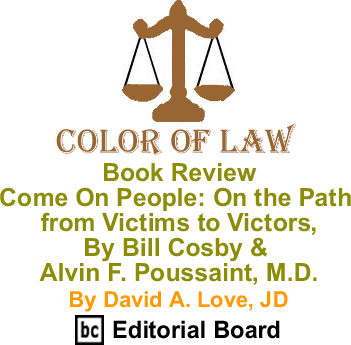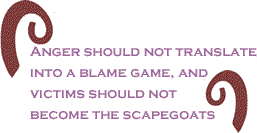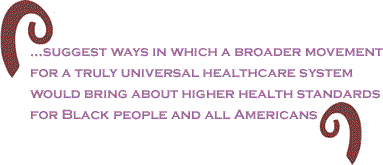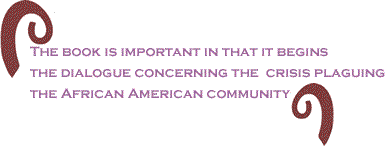
|
|||||||||||||||||||||
 |
|||||||||||||||||||||
 |
||||||||||
|
||||||||||
|
The current issue is always free to everyone If
you need the access available to a |
||||||||||
 |
||||||||||
 |
||||||||||
 |
||||||||||
These days, Black youth are not a popular cause. Blamed, vilified and scapegoated, they seem to take the hit for all that is wrong with society. And many in the Black community, it seems, have washed their hands of their children. When I read the new book by Bill Cosby and Dr. Alvin F. Poussaint, M.D., Come On People: On the Path from Victims to Victors (Thomas Nelson, 288 pp.), I couldn’t help but think of the remarks by Oprah Winfrey in January, 2007. After announcing that she was giving $40 million to start a girls’ school in South Africa, she told Newsweek that she became frustrated with visiting inner-city schools in the U.S. and stopped going, and that these children care more about iPods or sneakers than about learning. In Come On People, the authors provide a stinging critique of all that is wrong with Black youth and the Black community in general. Their book provides a mix of social-scientific analysis, tough love and up-by-the-bootstraps advice. To be sure, the problems we face are many: poverty, low education, shortage of role models, violence, hyper-incarceration, self-hate, breakdown of community, mental health problems, shorter life expectancies, etc. Many children are being ignored. And those who are in, of and from the Black community become angry over what is taking place. However, anger should not translate into a blame game, and victims should not become the scapegoats. Becoming fodder for conservative think tanks and other enemies of people of color is not a desired goal, and this is something the book comes close to doing, however unintentionally and unwittingly. Self-help and community-based solutions - for which Cosby and Poussaint advocate in their book - are but one part of the puzzle, albeit an important one. They give sound advice on numerous issues, including the crisis of Black men, addressing violence in the home, ensuring that parents are involved in the education of their children, community-based job creation and entrepreneurship, and improving our neighborhoods, to name a few.
Considering the healthcare challenges facing this nation and the Black community in particular, such as prenatal care, the authors seem to shrug their shoulders by concluding that “[w]e can talk all we want about an imperfect health-care system, but that we can’t control. What we can control is what is going on when the child is in the womb.” A more thoughtful and comprehensive analysis would acknowledge that which individuals can do to ensure the health of their children, but also suggest ways in which a broader movement for a truly universal healthcare system would bring about higher health standards for Black people and all Americans. Cosby and Poussaint rightly criticize gangsta rap, its misogyny and ignorance, its self-hatred and other destructive characteristics. But the book seems to conflate gangsta rap and the rest of hip-hop, which is an important and valuable cultural force, and seems to blame “Black English” for Black people not being able to get out of poverty. Such simplistic explanations for poverty fail to examine the larger forces at play, including regressive economic policies, which have shifted wealth upward, and have created a far less economically mobile country than Canada, and Western Europe. One-sixth of American children are in poverty. Nearly one-half of African Americans born to middle-income families will wind up in poverty. And as a recent Pew study suggests, while only a third of Americans earn more money than their parents, the rest of us are either treading water or sinking. Speaking proper English, not listening to explicit rap lyrics, and putting on a tie and going to church will not resolve these greater issues.
Come On People is recommended reading, not because it provides solutions to all of Black peoples’ woes. Perhaps no book can accomplish so much. However, the book is important in that it begins the dialogue concerning the crisis plaguing the African American community. The authors have paid their dues - Dr. Poussaint has dedicated his career to issues of child psychiatry and raising Black children, and understanding the links between racism and mental health, while Mr. Cosby has put his money where his mouth is in terms of his support of HBCUs. Although they fall short of addressing solutions that take into account a larger call for racial, economic and social justice, they give their audience much to consider. BlackCommentator.com
Editorial
Board member David A. Love, JD is a lawyer and prisoners’
rights advocate based in
|
||||||||||
| February 7,
2008 Issue 263 |
|
| Executive Editor: Bill Fletcher, Jr. |
| Publisher: Peter Gamble |
| Printer Friendly Version in resizeable plain text format format |
 |
 |
 |
 |
| |
| |





















 One
aspect in which Come On People falls short is in its
full acknowledgement of the larger picture, the pernicious economic
forces and institutional racism endemic to our society, but
perhaps that was not the purpose of the book. For example,
Cosby and Poussaint acknowledge the role of racism and the legacy
of slavery, but seem to downplay its effect by proclaiming that
racism is not as bad today as it was in the 1950s. They say
that while Whites once outnumbered Blacks in prison, it is now
reversed. Failing to reflect on the racial inequities in the
justice system, and the deliberate policies which have created
a
One
aspect in which Come On People falls short is in its
full acknowledgement of the larger picture, the pernicious economic
forces and institutional racism endemic to our society, but
perhaps that was not the purpose of the book. For example,
Cosby and Poussaint acknowledge the role of racism and the legacy
of slavery, but seem to downplay its effect by proclaiming that
racism is not as bad today as it was in the 1950s. They say
that while Whites once outnumbered Blacks in prison, it is now
reversed. Failing to reflect on the racial inequities in the
justice system, and the deliberate policies which have created
a  Finally,
the book fails to place blame on those members of the Black
community who have made it, yet have fled from the scene and
have not given back to the neighborhoods that supported them.
These are the “Talented Tenth,” those who hold the annual cotillions,
fashion shows and chicken dinners, patting themselves on the
back for being successful, cute, well-dressed, and educated,
presenting awards for inaction and irrelevance. They have proclaimed
that they have arrived, that the civil rights movement is over,
that all of that racism talk is passé. Their mantra has been
personal gain without collective responsibility to the community.
They even believe that they are somehow different than, better
than, those they left behind. Many of our poor children are
in deep trouble, but that is because we abandoned them and put
them in their situation.
Finally,
the book fails to place blame on those members of the Black
community who have made it, yet have fled from the scene and
have not given back to the neighborhoods that supported them.
These are the “Talented Tenth,” those who hold the annual cotillions,
fashion shows and chicken dinners, patting themselves on the
back for being successful, cute, well-dressed, and educated,
presenting awards for inaction and irrelevance. They have proclaimed
that they have arrived, that the civil rights movement is over,
that all of that racism talk is passé. Their mantra has been
personal gain without collective responsibility to the community.
They even believe that they are somehow different than, better
than, those they left behind. Many of our poor children are
in deep trouble, but that is because we abandoned them and put
them in their situation. 






